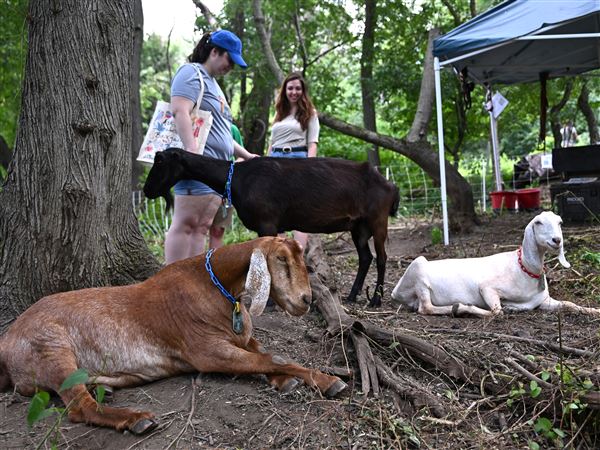California last month banned slaughtering pigs too crippled to walk and the Maryland House voted to ban the steel leg-hold trap. These are just two of a growing number of signs that humankind is beginning to emerge from a might-makes-right relationship to animals.
To this day, animals have been defined as nothing more than property for human use. Each year, we confine more than 50 billion in industrialized conditions before sending them to slaughter. The problem with this is that animals have feelings.
As an animal behaviorist, I've been monitoring mounting scientific evidence that animals experience feelings just as we do, and that they lead rich mental and emotional lives. Never before has there been as much interest in animals' inner worlds. Today, we are uncovering aspects of animal awareness, intelligence, perceptions, emotionality and even virtue that would have been deemed fantasy 50 years ago.
The common belief that animals live only in the moment is a myth. For instance, mother baboons grieve the loss of an infant. Their levels of glucocorticoids -- a hormone associated with grief in women who have lost a child -- rise for a month or more following their loss, as do those of their closest companions. Like humans, baboons respond to their loss by expanding their social networks. They spend more time grooming among friends. It's a form of therapy.
Starlings also show long-lasting moods. Confined alone to small, barren cages with no companionship, starlings become pessimistic. Offered a dish that may contain either tasty or bitter food, they are less likely to remove the cover and try it than are birds living in large aviaries with other starlings. Once again, the response mirrors that of humans, who when depressed take a dim outlook on life and avoid trying new things.
Animals are intelligent and aware. When migrating elephants encounter urine surreptitiously placed by scientists, they don't take much notice if it belongs to an elephant walking ahead of them. But if the urine belongs to an elephant walking behind them, they act surprised. They know something's out of place. Elephants keep tabs on up to 30 family members based on urine alone. I'm not sure it's a skill I'd like to have, but it's useful to them.
Chimpanzees outperform humans on short-term memory tests. When the numbers 1 to 9 appear scattered randomly on a computer screen, a chimp can recall the numbers in sequence, even when they are visible for less than a second. We rarely get beyond 4.
Dolphins use the equivalent of names -- each has her own signature whistle, and others use it to refer to her. Spectacled parrotlet parents similarly use a unique label for each chick when calling them to the nest. Chickens have a vocabulary of at least 30 calls and prairie dogs have more than 100, including modifiers for size, shape and color, and whether an approaching human is carrying a gun.
A new frontier of animal study is their virtue. Social living requires cooperation, restraint and compromise, so we may expect animals to show consideration for each other. And they do. Sharing, helping, nurturing, reconciling, consoling and empathy are turning up in many species.
What does this mean for our relationship to animals? I think it means that traditional views -- that they were put here for us to use and profit from -- need a dramatic overhaul. It means that our current treatment of them is profoundly out of step with their capacities as sentient individuals.
Our ethical systems ascribe rights and privileges to fellow humans. The bedrock of these ethical values is our shared capacity to suffer and to enjoy life. Animals share those capacities with us. It's time we applied our ethical principles to them, too.
First Published: April 15, 2010, 4:00 a.m.














